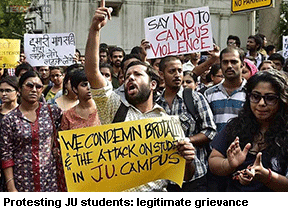EVER SINCE MAY 2011 WHEN THE Mamata Banerjee-led Trinamool Congress party was voted to power in West Bengal (pop. 91 million) bringing 34 years of rule by the CPM (Communist Party of India-Marxist)-led Left Front government to an ignominious end, the state has been generating media headlines for all the wrong reasons including shut-down of industries, corruption scams and incidents of student violence. As if to compound the mess, on September 16 police brutally suppressed a peaceful protest by students of West Bengal’s top-ranked Jadavpur University (JU) demanding a fair enquiry into a case of molestation inside the campus.
 According to spokespersons of the agitating students, a second year woman student was sexually molested by a group of students within the campus perimeter on August 28. When the JU management failed to investigate her complaint, she filed an FIR (first information report) at the local police station. With neither the varsity authorities nor the police responding to her FIR for almost a fortnight, on September 16 a group of 200 students gheraoed interim vice chancellor Abhijit Chakrabarti and 12 members of the executive council. Confined to his office for over 12 hours, Chakrabarti called in the police who lathi-charged the protesting students, injuring and hospitalising 30 and arresting 36.
According to spokespersons of the agitating students, a second year woman student was sexually molested by a group of students within the campus perimeter on August 28. When the JU management failed to investigate her complaint, she filed an FIR (first information report) at the local police station. With neither the varsity authorities nor the police responding to her FIR for almost a fortnight, on September 16 a group of 200 students gheraoed interim vice chancellor Abhijit Chakrabarti and 12 members of the executive council. Confined to his office for over 12 hours, Chakrabarti called in the police who lathi-charged the protesting students, injuring and hospitalising 30 and arresting 36.
The extraordinary and excessive force employed by the police against JU students who had a legitimate grievance, outraged Kolkata’s citizenry prompting more than 50,000 people from all walks of life to participate in a protest rally on September 20 which demanded Chakrabarti’s resignation. With typical nonchalance, chief minister Banerjee dismissed the brutal assault on the protesting students as a “small incident”, and urged students who have boycotted classes, to get back to their studies.
The steep deterioration of law and order under TMC rule, and the September 16 police assault on JU students has outraged public opinion. Governor Kesharinath Tripathi, who is also counselor of the university, reportedly assured the varsity’s protesting students of his support as have alumni, teachers and civil society. With the governor endowed by the TMC government with wide powers to choose the JU vice chancellor from a short-list of three educationists — including Chakrabarti — nominated by a selection committee, Chakrabarti’s chances have dimmed considerably.
“As the TMC administration is becoming implicated in scam after scam and the Kolkata high court having reproached it for shoddy investigation and police work, the state government is increasingly using strong-arm tactics to suppress student protests. In the process, academic standards are continuously sliding in West Bengal,” says Dr. Prasenjit Chattopadhyay, professor of English at the Sree Chaitanya Mahavidyalaya, North 24 Parganas.
With each passing day it’s becoming increasingly clear that under TMC rule lumpenisation of academia, hitherto governed by the bhadralok — the state’s refined urban middle class — is accelerating. “What one sees in Kolkata now is the city catching up with its anarchic hinterland, becoming West Bengalicised,” writes Indrajit Hazra in the Times of India (September 23)
Baishali Mukherjee (Kolkata)